
UNHCR, the UN Refugee Agency, has warned of a looming humanitarian crisis in Afghanistan as the escalating conflict brings increased human suffering and civilian displacement.
An estimated 270,000 Afghans have been newly displaced inside the country since January 2021 – primarily due to insecurity and violence – bringing the total uprooted population to over 3.5 million, the UNHCR said in a statement Tuesday.
Families forced to flee their homes in recent weeks cite the worsening security situation as the predominant reason for their flight.
In addition to ongoing fighting, displaced civilians have told UNHCR and partners of incidents of extortion by non-state armed groups and the presence of improvised explosive devices (IEDs) on major roads. Many have reported interruptions to social services and a loss of income due to rising insecurity.
The number of civilian casualties has risen 29 percent during the first quarter of this year compared to 2020, according to the UN Assistance Mission in Afghanistan (UNAMA). An increasing proportion of women and children were among those targeted.
The needs of those who have had to flee suddenly are acute, UNHCR said in the statement adding that the organization and its partners are assisting newly displaced Afghans with emergency shelter, food, health, water and sanitation support and cash assistance.
The UNHCR also warned that a failure to reach a peace agreement in Afghanistan and stem the current violence will lead to further displacement within the country, as well as to neighbouring countries and beyond.
The organization in turn called on the international community to step up support to the Afghan government and the people at this critical moment, in a spirit of solidarity and burden-sharing.
“Humanitarian resources are currently falling dramatically short. UNHCR’s financial appeal for the Afghanistan situation (including operations for Afghan refugees in Pakistan and Iran) remains acutely underfunded, at only 43 percent of a total $337 million required,” the statement read.
